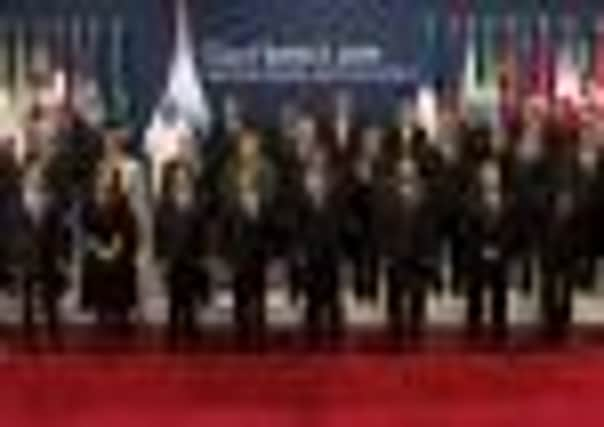Party-pooper Papandreou leaves leaders in the lurch


RARELY can a collection of the world’s most powerful people have looked so powerless.
The mammoth G20 roadshow, replete with thousands of journalists, officials, hangers-on, and security men, yesterday appeared a mere sideshow to a cabinet meeting taking place in a small peripheral nation on the edge of Europe.
Advertisement
Hide AdAdvertisement
Hide AdEvents in Greece, a few hundred miles east, were occupying everyone’s thoughts. In Cannes, chaos reigned. Greek prime minister George Papandreou is the world’s worst party guest. In Cannes, he arrived early on the eve of the summit, smashed up all the careful preparations and –by the time the rest of the guests arrived yesterday morning – had headed off home.
Not surprisingly, the host – Nicolas Sarkozy – was left cutting a forlorn figure. For the French president, who is facing a tetchy voting public ahead of next year’s elections here, this summit was supposed to be the moment he held the world in his palm, and showed that he was serieux – or sound, a quality the French like in their leaders.
Presumably he envisaged blue skies, smiles with Barack Obama, and a major deal to settle global economic nerves. Instead, he got pouring rain, Mr Papandreou hogging the limelight, and Mr Obama laughing at his appearance. The Obama-Sarkozy meeting was one of the first events yesterday. Mr Obama’s Air Force One had landed at Nice Airport a few hours earlier, a giant among the Lilliputian jets used by every other global leader.
Obama retains his star quality, despite three years in office; as he was met by Mr Sarkozy at the steps of the Palais Des Festivals he headed off to greet the cheering French crowds. Soon the pair were in Press Briefing Room One to discuss matters of great global significance. Except Mr Obama wanted to talk about Mr Sarkozy’s new daughter, Giulia, born last week to his glamorous wife Carla Bruni. “I’m confident that Giulia inherited her mother’s looks, rather than her father’s,” declared Mr Obama. The notoriously sensitive Mr Sarkozy – who was wearing his normal extra thick heels to compensate for his 5ft 5in frame, sought to assemble a smile on his face.
By this time, Prime Minister David Cameron arrived, having chosen to fly in by RAF plane, rather than a scheduled British Airways flight, so he could hold bilateral talks in the morning with the Indian and Japanese delegations – the latter partly to say sorry for not making a trip there last week.
Elsewhere, eurozone leaders were locked in talks, with both Spain’s Jose-Marie Zapatero and Italy’s Silvio Berlusconi under the microscope. The night before Mr Berlusconi had failed to push through further reforms in the Italian parliament aimed at winning over market confidence.
The leaders of the two heavily indebted nations – both of which are feared to be next in line if a Greek default occurred – were said to be facing heavy pressure to ensure they got their houses in order. There was no confirmation of what went on, however, as a press conference with EC president, Jose Manuel Barroso, and Herman Von Rompuy, president of the European Council, was abruptly cancelled.
No matter: there followed a magnificently pompous entry ceremony, as each elected leader was trumpeted in by a group of French soldiers straight out of Tintin. Meeting them was Mr Sarkozy, standing on a sodden red carpet. Most turned up in Peugeots and Citroens. Mr Cameron – of whom Mr Sarkozy declared he was “sick” last week – rolled up in an imperious Jag. The two men covered up the tension with stapled on smiles.
Advertisement
Hide AdAdvertisement
Hide AdIn the main plenary hall, overlooking a stormy Mediterranean, the leaders took their seats. Mr Obama had been placed next to Mr Sarkozy. Before sitting down, however, he offered a clear nod to the realities of power by making a bee-line straight away to talk to president Hu Jintao, of the People’s Republic of China. As they began talking, the news from Greece was getting hotter: rumours abounding that Mr Papandreou was about to head off to meet the Greek president to hand in his resignation, and would be asking him to approve a new coalition government led by banker Lucas Papademos.
The farcical scenes kicked off in earnest. Officials said that leaders were actually checking their BlackBerrys, trying to keep up to date with what was going on – and also sending e-mails themselves as attention turned away from the G20 agenda and on to the Greek meltdown. The British contingent was keeping in close contact with their ambassador in Athens, who informed them that a report that Mr Papandreou was about to quit was shaky.
Outside the conference centre, a large wooden horse appeared outside the Cannes conference venue, in a protest against capitalism. First Greeks, now Trojans? Unlike the Greeks, it didn’t manage to get in. The bedlam continued as it emerged that Mr Papandreou wasn’t resigning, and that the referendum wasn’t actually going to happen after all.
Just after 5pm, speaking to reporters, George Osborne was asked what he made of the Greek situation. “It might have changed while I’m talking to you,” he said.
Mr Osborne insisted that other issues apart from the eurozone crisis were being discussed by the leaders. But it was clear that the meeting had been entirely hijacked by the short-term crisis in the eurozone.
Outside, one protester had a blunt message for the leaders. On a placard, she had written: “Watch your Rolex. The hour of revolution is nigh.”